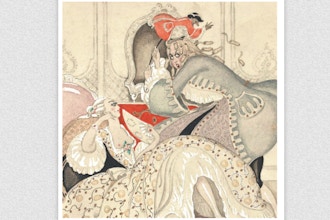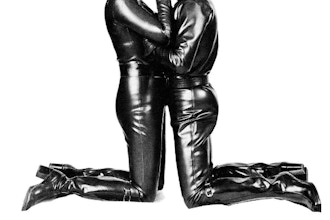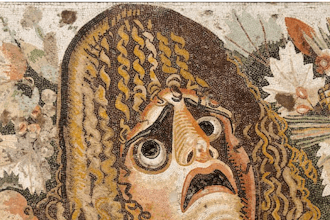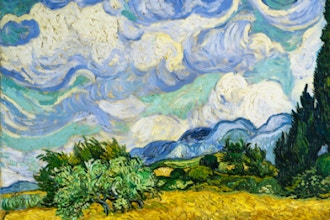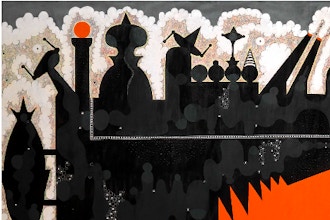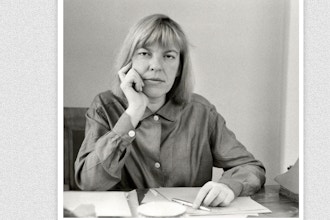Brooklyn Institute for Social Research
Upcoming Classes in NYC
The Brooklyn Institute for Social Research, established in 2011, offers liberal arts education and research opportunities to local communities while supporting young scholars. With a mission to engage various intellectual traditions, the institute aims to provide accessible education and foster active, engaged citizens.
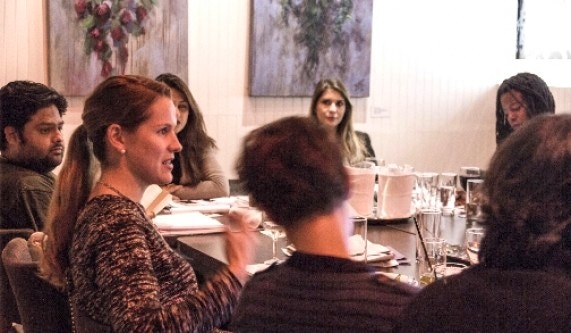
3 classes have spots left
Modern Poetry: Memory and Desire
Brooklyn Institute for Social Research
“April is the cruelest month,” writes T.S. Eliot in the opening lines of The Waste Land (1922), “breeding Lilacs out of the dead land, mixing Memory and desire.” What does modern poetry remember, and what does modern poetry want? This course, an introduction to the exhilarating, maddening, and strange experiments of twentieth-century poetry, explores how poets responded to the astonishing social, political, aesthetic, and technological...
Introduction to Intersectionality
Brooklyn Institute for Social Research
Intersectionality, a term coined by Kimberle Crenshaw, forcefully challenges the idea that gender is the primary factor organizing women’s lives. Drawing on black feminist and critical legal theory, Crenshaw maintains that the experience of being a woman must be understood through the interrelation of race and gender. In other words, she proposes racial justice as central to feminist theory and politics. In the 30-plus years since the publication...
Proofs for the Existence of God
Brooklyn Institute for Social Research
What is the relationship between faith and understanding? Is it possible to have certain knowledge about anything? Does morality depend on the existence of God? Can the order or disorder of the world tell us anything about a creator? Such questions have preoccupied philosophers for nearly a millennia. Not merely a problem for theologians, the question of whether it’s possible to prove the existence of God has stood at the center of some of...

CourseHorse Gift Card
Thousands of classes & experiences. No expiration. Gift an experience this holiday season and make it a memorable one. Lock in a price with the Inflation Buster Gift Card Price Adjuster™
Algebra: Rules and Symbols
Brooklyn Institute for Social Research
What is algebra? This question is not as simple as it seems. In this course, we will explore the meaning and extraordinary mathematical power of algebra through a study of its historical development. We’ll begin with so-called classical algebra—or the invented use of letter symbols (variables) to represent numbers and the rules for their manipulation. Using variables led to the key concepts such as polynomials and a focus on solving equations–a...
Thucydides: War and Civilization
Brooklyn Institute for Social Research
Thucydides’ History of the Peloponnesian War recounts the disastrous, 27-year war between Athens and Sparta. The Peloponnesian War brought to an end both democracy in Athens and the traditional Spartan aristocracy. Also destroyed was the classical idea of the city-state itself, with its attendant conceptions of citizenship and civic life. Through its mix of speeches, narrative, and analysis, Thucydides’ History presents...
Modern Palestine: a Historical Introduction
Brooklyn Institute for Social Research
Perpetually in the news and commanding a tremendous amount of scholarly attention, Palestine remains a flashpoint in a number of contemporary debates: about war, colonization, and violence, religious and ethnic identity, nationalism and self-determination, modes of resistance, the role of international institutions, diasporic politics, academic freedom, and American foreign policy, among others. This course offers students an opportunity step back...
Pornography: Aesthetics, Politics, and Pleasure
Brooklyn Institute for Social Research
Pornography is one of humanity’s oldest, and most enduring artifacts. Variously celebrated and demonized, it has decorated sumptuous palaces and been furtively sold under pain of arrest. In the modern United States, it is kept studiously out of sight, and yet is simultaneously omnipresent and accessible in its most explicit forms with a simple click of the mouse. What is pornography? What does it do? Why do we treat it so inconsistently?...
Kathy Acker: Experimentation and Transgression
Brooklyn Institute for Social Research
Spanning many forms—novels, plays, and essays—Kathy Acker’s work is hard to classify. Above all, Acker aims to challenge established literary conventions, and she does so by experimenting with methods of cut-up (inspired by William S. Burroughs), mash-up, sampling, and transposition. She “steals” characters and plotlines from writers like Charles Dickens, Georges Bataille, Daniel Hawthorne, and Emily Brontë. And she mines content from...
Theories of Consent: Subjectivity and Sexual Ethics
Brooklyn Institute for Social Research
What does it mean to say yes or no? Do we—or can we—always know the consequences of what we agree to? What criteria do we use to assess when consent can or cannot be freely given? And just who is the self that says yes or no? In what ways is the ability to consent, and to evaluate consent, bound up with notions of will, agency, and autonomy? In other words, how does the idea of consent implicate everything from our notions of individual subjectivity...
The Politics of Oil: State, Economy, and Geopolitics
Brooklyn Institute for Social Research
From early concessions to American and British speculators to the creation of Aramco in 1933, mid-century attempts to nationalize oil industries, the 1973 oil shock, and the Iraq wars, oil has structured the history of the modern Middle East in fundamental ways. In this course, we will examine the pivotal role of oil resources, companies, and energy demands in shaping state and society in the region. We will ask: What types of political and social...
Sharia: An Introduction to Islamic Law
Brooklyn Institute for Social Research @ 68 Jay St, Brooklyn, NY
Sharia is often portrayed as Islamic legal maxims and corporal punishment—a rigid, “medieval” religious law, dating from the 7th century Arabia, that’s allegedly incompatible with modern democracy. But this image bears little resemblance to reality. Not only is Sharia a highly complex legal system, it’s also a metaphysical idea, a way of talking about communal life, and a moral law constantly subject to criticism, debate,...
Euripides: the Varieties of Tragedy
Brooklyn Institute for Social Research
To Aristotle, Euripides was “the most tragic of poets.” To his contemporary Aristophanes, he was a “morality-destroying quibbler and quarreler.” To Nietzsche, Euripides was, along with Socrates, the co-destroyer of tragedy. Behind these critical evaluations stands an extraordinarily variegated body of work: tragedies of intense psychological focus, of political engagement and despair, of romantic intrigue and...
Poetry and Poetics: An Introduction
Brooklyn Institute for Social Research @ 230 5th Ave, Brooklyn, NY
What is poetry and what is it good for? These questions have long haunted practitioners and readers of this “beautiful and pointless” art, to quote the contemporary critic David Orr. But “beautiful and pointless” were not always the terms of the debate. On the contrary, these questions about what poetry is and what it does mean something profoundly different in our contemporary moment than they meant in centuries past. Nor is this sense of...
Race, Reproduction, and Right-Wing Feminism
Brooklyn Institute for Social Research
Femonationalism: Race, Reproduction, and Right-Wing Feminism How and when have colonial and racist oppression been perpetrated in the name of women’s rights? How did eugenics, xenophobia, and nationalism become the project of some feminists, even to this day? While feminist liberation struggles continue to dream abolitionist futures and shape history, certain strands of women’s activism have been anti-liberatory, right from the get-go. In other...
The Making of the Modern Middle East
Brooklyn Institute for Social Research
The Making of the Modern Middle East: From Postcolonialism to the Arab Spring The last decade has seen revolutionary movements take place throughout the Middle East and North Africa. From Tunisia and Egypt to Sudan, Libya, Syria, Yemen, and Bahrain, people have banded together (with mixed results) in attempts to overturn long-standing dictators and authoritarian regimes. Yet many of the regimes in question were themselves the heirs to an earlier...
Ingeborg Bachmann: Literature and Anti-Fascism
Brooklyn Institute for Social Research
Indelibly marked by the catastrophes of the mid-20th century, the Austrian novelist and poet Ingeborg Bachmann raised questions that disrupt and traverse the bourgeois academic boundaries of postcolonial, feminist, materialist, existentialist and anti-fascist art, thought, and politics—boundaries that dissolve as we confront the history and strange condition of the post-war West. In Bachmann’s work, life clashes and combusts with language,...
International Political Economy: an Introduction
Brooklyn Institute for Social Research
Talk of the global economy today often turns on questions of globalization and financialization. Twenty-first century capitalism is simultaneously highly concentrated and internationally far-flung. Production is organized across complex “Global Value Chains” in multiple geographies by large transnational corporations, all the while financed by a handful of major banks and funds. Advocates of globalization argue that “free market” policies...
The Epic of Gilgamesh
Brooklyn Institute for Social Research
The epic poem of Gilgamesh, discovered amongst the ruins of the library of Ashurbanipal, the last great Assyrian king, tells the tale of its titular hero—a Mesopotamian king who combats the gods, befriends the wild man Enkidu, and seeks, in the realms of the dead, the secret to eternal life. First translated in the late 19th century, the epic of Gilgamesh immediately captured the attention of Biblical scholars, poets, novelists,...
Origins of German Romanticism
Brooklyn Institute for Social Research
Are art and philosophy irreconcilable? Since Plato, western thinkers have tended to uphold philosophy as the domain of reason and objective inquiry, and art as belonging to the sphere of the non-rational—as the instigator, even, of counter-rational emotions and passions, subjective flights of fancy and imagination. For the members of the so-called Frühromantik, or early German romantic movement, the truth was exactly the opposite: Art...
Thinking Machines: An Introduction to AI
Brooklyn Institute for Social Research @ 30 Irving Pl, New York, NY
Thinking Machines: An Introduction to Artificial Intelligence Can a computer be intelligent? That is, can the abilities of the human mind be reproduced by computer hardware and software? Dating to the origins of computing, the question of artificial intelligence is among the central problems of the modern age, its ramifications impacting not only computer science and adjacent fields of cognitive science and philosophy of mind, but also long-standing...
-
Price Lock Guarantee
Secure your booking now and we'll match any price drop within 48 hours across all booking platforms, ensuring you never miss out on savings!
-
Earn 10% Reward Points
Maximize your savings with every purchase. Unlock rewards on every transaction, ensuring you get the most value out of your experience!
-
No Added Fees
Enjoy hassle-free transactions without worrying about additional charges. With us, what you see is what you pay - no surprises!
-
Curated Courses
Discover a curated selection of courses handpicked by experts in the field. Dive into quality content that suits your learning needs and interests!







